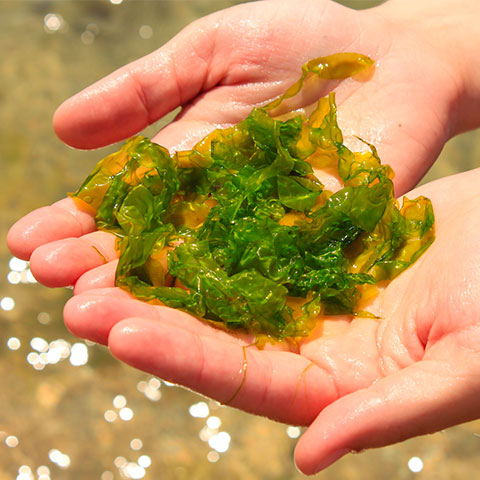
In the previous article we were analyzing what it is and what are the properties of this type of new generation algae.
In addition to the great qualities that it has, and that we already define and analyze so widely, in this article we will focus on explaining what are the main benefits that Chlorella will provide when we include it in our diet, consuming it in the form of a nutritional supplement.
Fourteen are the main benefits that we have been able to extract from the scientific studies consulted. The first seven are detailed below:
1st Benefit: Detoxification
One of the most important benefits of Chlorella is that it is a natural detoxifier of heavy metals and various chemical substances, which can be found in our body. Similarly, it can absorb certain types of pathogens that are present in some foods when cooked at high temperatures (carcinogens).
This is possible thanks to the chlorophyllin and chlorophyll abundantly possessed by this algae. Also, thanks to chlorophyll, it is able to cleanse the intestine and lymphatic system, as well as the liver and blood. Also, Chlorella can absorb pathogens and toxins thanks to the peculiar structure of its cell membrane, which is composed of three layers.
The last layer, the outermost one, is formed by a carotenoid substance, which makes it possible to absorb and eliminate toxic elements from the body.
How does it work? Chlorella is wrapped in toxins that reside in the human body, usually from heavy metals (such as mercury, cadmium, uranium and lead), as well as dioxins, herbicides, pesticides and radiation, among others.
In this way, it prevents these toxins from being reabsorbed by our own organism (Guerrero, 2013). If we incorporate Chlorella into our diet, on a regular basis, we can prevent these heavy metals from accumulating in our tissues and organs, which is a fundamental help to avoid the pathologies and symptoms characteristic of heavy metal poisoning, such as: joint pain, depression, fatigue, digestive discomfort, and problems in reproduction and fertility, among many others (Panahi et al., 2016).
If we take into account that chemicals and heavy metals are part of our daily lives (fish contaminated with mercury, dental fillings, pesticides, lead paints, chemicals in the air and water, etc.)
Chlorella can be an extraordinary help to detoxify us and eliminate all the negative that the body receives from outside.
2nd Benefit: Superfood
Chlorella has such a complete nutritional profile that it is considered a superfood, since it is a complete source of protein and, consequently, it contains the 9 essential amino acids. It also contains vitamin B12, iron and vitamin C (which is necessary to help absorb iron).

And, as we said, it provides a wide range of antioxidants and small amounts of magnesium, zinc, copper, potassium, calcium, folic acid and other vitamins of group B. Like other algae it contains Omega3 and, in large quantities, it can be A good source of fiber.
In addition, Chlorella is one of the richest nutrient superfoods since 3 tablespoons contain (Chidley and Davidson, 2018):
• Proteins 16 grams
• Vitamin A – 287%
• Vitamin B2 – 71%
• Vitamin B3 – 33%
• Iron – 202%
• Magnesium – 22%
• Zinc – 133%
Although it should be noted that the nutrient content depends on the culture conditions, the species used and how it is processed, something that we will explain in more detail in the next article.
3rd Benefit: Antioxidant
Chlorella algae have compounds considered as antioxidants, such as vitamin C, chlorophyll, lycopene, lutein and beta-carotene.
These elements help fight many chronic diseases (Halperin et al., 2003). They also reduce the complications that can result from diabetes, and have been especially beneficial in smoking patients, in which antioxidant levels increase with their intake.
4th Benefit: Reduces the side effects of Radiotherapy and Chemotherapy
We know that chemotherapy and radiotherapy are, for the moment, the most common forms of cancer treatment.
According to the latest studies carried out with Chlorella, the high levels of chlorophyll in this algae are important protectors of the body against ultraviolet radiation treatments, while destroying the radioactive particles of the body (Zahran and Risha, 2014).
Based on this, it is stated (Hasegawa et al., 2002) that cellular components and immune system functions approach normal levels, being affected to a lesser extent when subjects with the disease are under chemotherapy treatment , or they take medications that aim to suppress or lessen the ability of an immune response to avoid rejection of a transplant, for example, or when taking steroids (Panahi et al., 2016).
Studies also confirm that with Chlorella algae, patients have fewer respiratory infections and flu-like illnesses.
5th Benefit: Reduces cholesterol
Taking as a source different scientific studies, it is postulated that there is a clear relationship between Omega3 acids and the fiber that Chlorella has (Lin and Lowary, 2018).
Based on this relationship, there was a reduction in the concentrations of total cholesterol, LDL cholesterol or “bad cholesterol”, and triglycerides, which prodiga it as a good option for people who have high cholesterol and want to reduce it With natural products.
6th Benefit: Stimulates the immune system
 Different studies confirm that Chlorella is very useful for our body, since it benefits the immune system by acting directly on T and B lymphocytes, macrophages and the production and stimulation of red and white blood cells (Zahran and Risha, 2014) .
Different studies confirm that Chlorella is very useful for our body, since it benefits the immune system by acting directly on T and B lymphocytes, macrophages and the production and stimulation of red and white blood cells (Zahran and Risha, 2014) .
This favors the suppression of pathogenic microorganisms, bacteria, viruses and fungi that are generators of different diseases, so that by helping cell activity, they cause a healthier immune response (Chidley and Davidson, 2018).
7th Benefit: Reduces the level of sugar
When there is sugar in the blood, because there is insulin resistance, the disease developed is type 2 diabetes, which is a chronic disease that is increasingly common in our society (where there is more and more abuse of sugars and carbohydrates in the intake population).
In different studies it was found that using Chlorella as a supplement helps reduce cholesterol and blood glucose levels. Chlorella, which generates cell activation, improves insulin sensitivity, reduces blood sugar levels and helps patients to use existing glucose as energy (Nakano, Takekoshi and Nakano, 2007).
But these are only half of the benefits that Chlorella has for our health. It would be too extensive to do everything in this article, so we urge you to continue discovering the enormous benefits for our organism that has this microalgae. Do not miss the second part !!!!
References:
Chidley, C. and Davidson, G. (2018). The effect of Chlorella pyrenoidosa supplementation on immune responses to 2 days of intensified training responses to 2 days of intensified training. European Journal of Nutr., 57 (7), 2529-2536. DOI 10.1007 / s00394-017-1525-9.
Guerrero, R. (2013). How algae heal. Barcelona: RBA Editorial
Halperin, S.A. et al. (2003). Safety and immunoenhancing effect of a Chlorella-derived dietary supplement in healthy adults undergoing influenza vaccination: randomized, double-blind, placebo-controlled trial. CMAJ, 169 (1), 111-117.
Hasegawa, T. et al. (2002). Toll-like receptor 2 is at least partly involved in the antitumor activity of glycoprotein from Chlorella vulgaris. Int.Immunopharmacol., 2 (4), 579-589.
Lin, S. and Lowary, TL. (2018). Synthesis of the Highly Branched Hexasaccharide Core of Chlorella Virus N-Linked Glycans. Chemistry, 3 (2), 26-31. DOI: 10.1002 / chem.201804795.
Nakano, S., Takekoshi, H. and Nakano, M. (2007). Chlorella (Chlorella pyrenoidosa) supplementation decreases dioxin and increases immunoglobulin a concentrations in breast milk. J Med Food. , 10 (1), 134-142.
Panahi, Y. et al. (2016). Chlorella vulgaris: A Multifunctional Dietary Supplement with Diverse Medicinal Properties. Curr Pharm., 22 (2), 164-173.
Zahran, E. and Risha, E. (2014). Modulatory role of dietary Chlorella vulgaris powder against arsenicinduced immunotoxicity and oxidative stress in Nile tilapia (Oreochromis niloticus). Fish Shellfish Immunol., 41 (2), 654-662.



